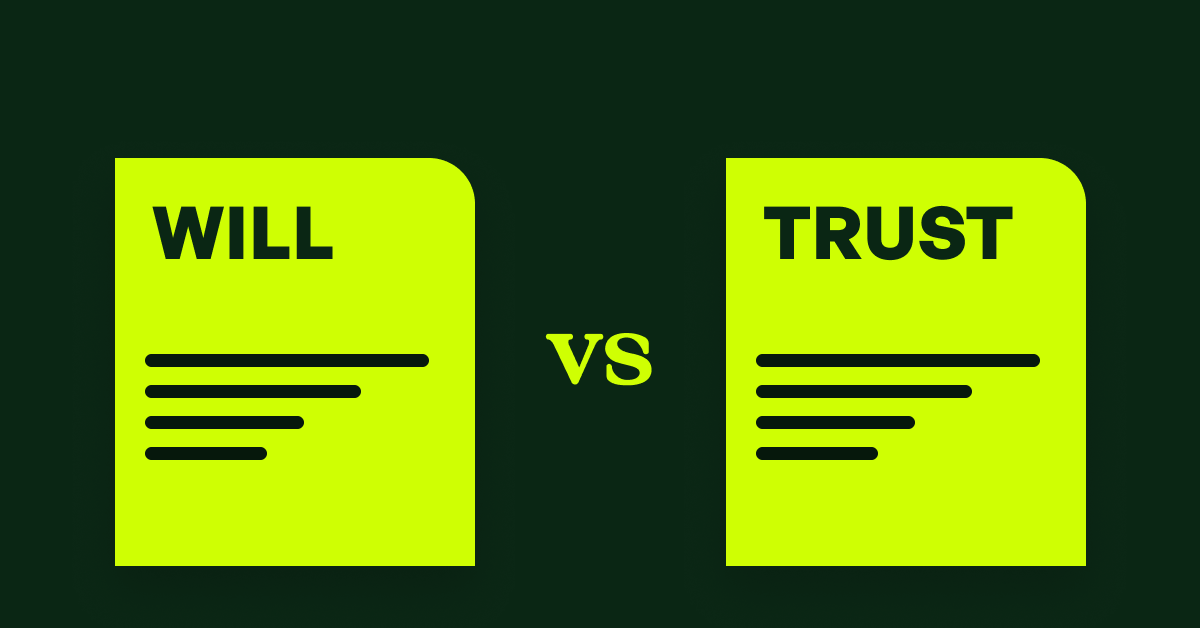Will vs. Trust: What Do You Need? Cost, Process and Uses

What is a will?
A will is a legal document that outlines how your assets and property should be distributed upon your death. A will also allows you to name a guardian for your minor children.
A will can be changed at any time and is only effective upon your death. If you become incapacitated and are unable to make your own decisions, a will does not provide any guidance or protection.
A will is submitted to probate court, which is a public process to determine the validity of the will and to distribute assets. Probate can be costly and time consuming.
What is a trust?
A trust is a legal agreement between three parties: the grantor, the trustee and the beneficiary. The grantor is the person who creates the trust and transfers their assets into it. The trustee is the person who agrees to manage the assets in the trust on behalf of the beneficiary. The beneficiary is the person who will receive the assets in the trust at some point in the future.
There are many different types of trusts that can accomplish a wide variety of estate planning goals. A few examples of when a trust may be used include:
• To avoid probate: Trusts are often used to help heirs avoid the probate process. This can help heirs receive their inheritance more quickly and with less expense. The probate process can also tie up assets for months or even years, which can be a significant burden for heirs.
• To minimize estate taxes: High-net-worth individuals may use trusts to help minimize estate taxes. When you transfer assets to a trust, you are essentially removing those assets from your taxable estate.
• To provide for minor children or other dependents: Trusts can help ensure that minor children and other dependents are provided for in the event of your death. In a trust, you can specify how and when you want the assets to be distributed to your beneficiaries. This can be particularly useful if you want to leave assets to a minor child.
What are the main differences between wills and trusts?
Wills and trusts are both tools you can use to pass assets to your heirs after you die. However, they are designed to meet different needs and they operate differently.
A will is a legal document that provides instructions for how you want your property to be distributed after you die. It also allows you to name a guardian for your minor children and an executor for your estate.
A trust is a legal arrangement in which a person or entity holds assets for the benefit of one or more beneficiaries. Trusts can be used to avoid probate, reduce estate taxes, provide for minor children, protect assets, provide for a person with special needs, and more.
One of the biggest differences between wills and trusts is that wills go into effect only after you die, while a trust can be put into effect while you are still alive or after you die.
What are the main similarities between wills and trusts?
There are a few key similarities between wills and trusts. Both wills and trusts can be used to distribute assets to beneficiaries. Trusts are typically used to distribute assets to beneficiaries while the grantor is still living and after they pass away. Wills are used to distribute assets to beneficiaries after the grantor has passed away.
Which is better
The best document for you is the one that meets your needs. If you want to leave your assets to your family after you die, then a will is probably the best option for you.
If you want to avoid probate, keep your estate private and plan for incapacity, then a revocable living trust may be your best choice.
If you have a disabled child or a child with special needs, you may want to consider a special needs trust. If you have a large estate, you may want to consider an irrevocable trust.
An estate planning attorney can help you determine the best plan for your needs.
a will or a trust?
Both wills and trusts have their pros and cons. The one that is best for you depends on your unique situation.
A will is a legal document that allows you to appoint a personal representative to distribute your assets, pay off any debts and handle any disputes. If you have minor children, you can also use a will to appoint a guardian for them.
A trust is a legal arrangement that allows a third party, or trustee, to hold assets on behalf of a beneficiary or beneficiaries. Trusts can be used to avoid probate, reduce estate taxes, protect assets and distribute assets to beneficiaries over time.
What are the costs of wills and trusts?
The cost of a will or a trust can vary widely based on the complexity of your estate, the attorney’s experience, and where you live. In general, the cost of creating a trust is higher than creating a will. But, the cost of administering a trust after you die is often lower than the cost of probate.
Average costs of creating a will:
• Do it yourself: $30 to $60
• Online will: $15 to $100
• Attorney: $200 to $1,000
Average costs of creating a trust:
• Do it yourself: $60 to $100
• Online trust: $100 to $1,000
• Attorney: $1,000 to $3,000
Average costs of probate:
• Percentage of the estate: 3% to 7%
• Attorney: $3,000 to $7,000
• Executor: 1% to 5%
Average costs of administering a trust:
• Percentage of the estate: 1% to 2%
• Attorney: $3,000 to $7,000
• Trustee: 1% to 5%
How long does it take to set up a will or trust?
Both wills and trusts can be set up in a matter of days. However, the more complex your situation, the longer it will take to set up your estate plan.
For example, if you have a lot of assets to transfer into a trust, it could take a few weeks to a few months to get everything in order.
It’s important to note that you should not wait until you are elderly to create an estate plan. If you have minor children, you should create a will that outlines guardianship in the event that something happens to you.
What can you do with a will or trust?
You can use a will or a trust to accomplish a lot of the same things, such as:
• Distribute property
• Name a guardian for minor children
• Name an executor or trustee
• Protect assets
However, there are a few things that are unique to a trust that you can’t do with a will. For example, you can use a trust to:
• Avoid probate
• Provide for a loved one with special needs
• Protect assets from creditors
• Protect assets from a lawsuit
If you have a specific need that you want to address in your estate plan, you may want to consider a trust. But, for most people, a will is sufficient for their needs.
What happens to a will or trust when you die?
A will becomes active when you die. The will is used to name an executor of your estate, who will then carry out the instructions in the will. The executor is responsible for inventorying your assets, paying off any debts, and distributing your assets as you specified in your will.
A trust, on the other hand, can be used while you are still alive or when you die. If you are too ill to manage your assets, the person you named as the trustee will take over. If you die, the trustee will distribute your assets as you specified in the trust.
Conclusion
Both wills and trusts offer a way to distribute your assets to your beneficiaries, but they do so in different ways. A will is a legal document that outlines your wishes for your assets and your dependents after your death. A trust is a legal arrangement that allows a third party to hold assets on behalf of a beneficiary or beneficiaries.
In general, a will is a better option for people who want a simple, affordable way to distribute their assets. A trust is a better option for people who want to reduce the tax implications of their estate or to protect their assets from creditors or divorce.
